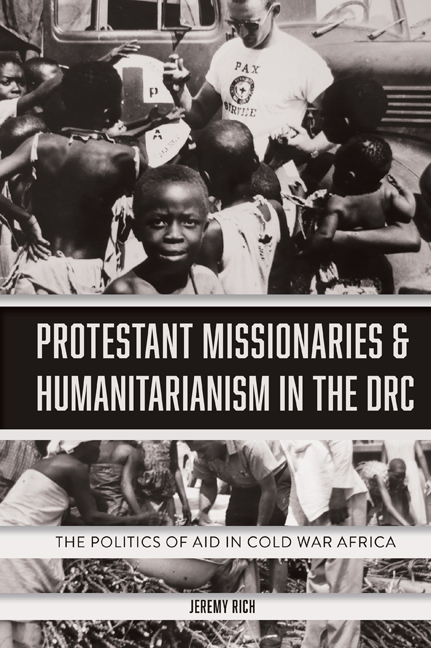Book contents
- Frontmatter
- Contents
- List of Illustrations
- Acknowledgements
- List of Abbreviations
- Introduction
- 1 The CPRA, Protestant Missions, and the Congo Crises, 1960–1965
- 2 The CPRA and Luba Refugees in South Kasai, 1960–1962
- 3 The CPRA and Angolan Refugees in the DRC, 1961–1967
- 4 The CPRA and the Simba Revolts, 1964–1967
- 5 Operation Doctor: The Rise and Fall of a Protestant Short-Term Medical Volunteer Programme
- 6 Protestant Volunteers and Medical Practice in the Congo in the 1960s
- 7 Changing Dollars into Zaires: The Challenges of a Humanitarian Aid NGO in the DRC, 1965–1973
- 8 The Centre for Community Development
- Conclusion
- Bibliography
- Index
5 - Operation Doctor: The Rise and Fall of a Protestant Short-Term Medical Volunteer Programme
Published online by Cambridge University Press: 11 September 2020
- Frontmatter
- Contents
- List of Illustrations
- Acknowledgements
- List of Abbreviations
- Introduction
- 1 The CPRA, Protestant Missions, and the Congo Crises, 1960–1965
- 2 The CPRA and Luba Refugees in South Kasai, 1960–1962
- 3 The CPRA and Angolan Refugees in the DRC, 1961–1967
- 4 The CPRA and the Simba Revolts, 1964–1967
- 5 Operation Doctor: The Rise and Fall of a Protestant Short-Term Medical Volunteer Programme
- 6 Protestant Volunteers and Medical Practice in the Congo in the 1960s
- 7 Changing Dollars into Zaires: The Challenges of a Humanitarian Aid NGO in the DRC, 1965–1973
- 8 The Centre for Community Development
- Conclusion
- Bibliography
- Index
Summary
In September 1962, the United Methodist Church magazine World Outlook published an article about Operation Doctor, a short-term medical mission project overseen by the Congolese Protestant Relief Agency. Dr James Jay, a doctor from Indianapolis who volunteered at the Kimpese mission hospi-tal, had returned full of a ‘missionary zeal that would fire the imagination of even the most doubtful skeptic’. Hundreds of Belgian as well as US mis-sionary doctors had fled the Democratic Republic of Congo in 1960. The article assured readers, ‘Thousands of Congolese, emaciated with malnutrition and stricken with an assortment of rare jungle diseases, plus others long ago brought under control in the United States, threw themselves on the mercy of a handful of mission hospitals and already overworked doctors.’ Such images of a newly independent Congo in desperate need of American saviours were commonplace in the US press in the early 1960s, just as the State Department and the Central Intelligence Agency sought to block Soviet influence and install a pro-Western government. Jay articulated the celebration of economic development in Africa as a means of showing the good will of Americans: ‘This is the assistance the church and the United States needs to bring, not atomic weapons and guns.’
Jay's enthusiastic description of his volunteer work expresses the hopes of ecumenical Protestants in Operation Doctor in the early 1960s. The Congo crises, much as the Nigerian civil war of 1967 to 1970, created new prospects for humanitarian medical interventions. Operation Doctor joined other organisations in filling the void left by the departed Belgians and the impoverished Congolese government. With the fate of North American Protestant missions in the DRC unclear in the early 1960s, Operation Doctor's approach appeared to be a possible alternative to the colonial-era model of medical ser-vices offered by individual denominations. Operation Doctor demonstrated a practical, altruistic model of ecumenical ideals faced with the challenges of African decolonisation.
Operation Doctor's chaotic origins in 1960 led to a small but steady supply of North American medical professionals from 1961 to 1964. The Church World Service (CWS), the main benefactor of the programme, had envisioned Operation Doctor as a five-year project that would close down once the DRC's state medical services were ready. However, the Simba revolts disrupted Operation Doctor's ability to convince professionals to come to the Congo.
- Type
- Chapter
- Information
- Protestant Missionaries and Humanitarianism in the DRCThe Politics of Aid in Cold War Africa, pp. 132 - 154Publisher: Boydell & BrewerPrint publication year: 2020



